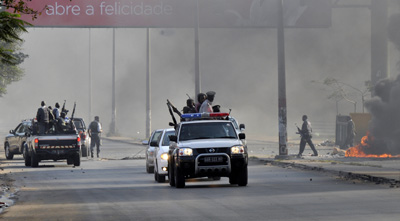This week’s deadly unrest in Mozambique became a global news story in part because reporters and citizen journalists used new media and social networking tools. Clashes between security forces and people protesting rising prices in the capital, Maputo, left at least seven people dead and more than 200 people injured, according to the latest news reports.
As the streets exploded with violence, one Maputo resident (@BarataJorge) observed that few local broadcasters were relaying information. “Demonstrations in Maputo. Radio Mozambique, just music, TV pass math class. News just in RTP Africa and STV.” Paul Fauvet, English service editor of Mozambique’s state news agency AIM, shared in an e-mail that the unrest disrupted the operations of some print media outlets. “The riots did close down the independent faxed daily Mediafax, which has not appeared for the last two days, because key people in the distribution were unable to reach the office. The daily paper Noticias appeared in its online version, but could not be distributed on the streets,” he wrote. Jornal a Verdade, a free weekly newspaper in Maputo overcame the logistical problems by using its website and Facebook fan page to post dozens of articles and videos in Portuguese. The paper’s editor, Erik Charas, was one of the first journalists to disseminate news of the crisis in English, helping to turn this local event into an international news story. Charas integrated an Ushahidi crisis reporting tool on the paper’s website and used his tweeter feed (@echaras) to post updates, crafting an English hashtag: #maputoriots.
There were also non-Mozambicans tweeting their experiences from the ground or commenting on the news. One international observer closely following the Maputo twitterers (@giantpandinha, self-described as working “in intl devt hack-dom”), tweeted links to video footage of the riots and commented that “this video is hard to believe: man shooting at rioters on the street below, from office [of] the ruling party in #Maputo.” When Maputo Twitterers and Portugal-based Jornal Noticias reported SMS messages were urging civil disobedience, @giantpandinha contrasted the wide use of SMS in Mozambique to the ban on messaging during anti-government protests in Ethiopia in 2005. “Meles ended SMS during the crisis in Addis in 2005, at least residents of Maputo still have to communicate via SMS.” Reporting from the streets of Maputo, South African journalist Nastasya Tay, used her Twitter feed to convey the perils and moment-to-moment uncertainty of unfolding chaos across the city. “Armoured trucks patrolling the street and shooting at unarmed crowds. Phone stolen in riot so belated tweets,” she wrote. Then, a few hours later, she added: “Windy morning in Maputo. The sound of an unexpected lone trumpeter rings out over the city. What does today hold?“
As more tweets appeared in English, more international news media outlets began to express interest in the Maputo Twitterers. On Thursday, for instance, @JorgeBarata received a tweet from freelance journalist Amandine Schmitt on behalf of the Observers news blog of broadcaster France 24. “Hello, how can we contact you to talk about Maputo riots? Please come back to us,” Schmitt wrote. Similarly, Chiaras received a tweet from Faith Karimi, a CNN International Wire news desk editor (@FaithCNN): “Are you in Maputo? Can you DM a phone. contact I can reach you for a story?“
Early this morning, Charas sounded the end of the riots. “After a 3hour round I can report that #maputoriots are no more. All roads are accessible, not blocked & no signs of trouble anywhere.”
As noted by Global Voices blogger Lova Rakotolomalala, who reported on the unrest in Madagascar in 2009, accuracy and context are often missing from citizen reporting in times of crises. This view was reiterated by @giantpandinha, who wrote “Tweet and rumor equal.” Nevertheless, the same user encouraged Mozambicans to tweet in many languages using the hashtag #Maputo. He added: “The world cares about you, Mozambique.”
